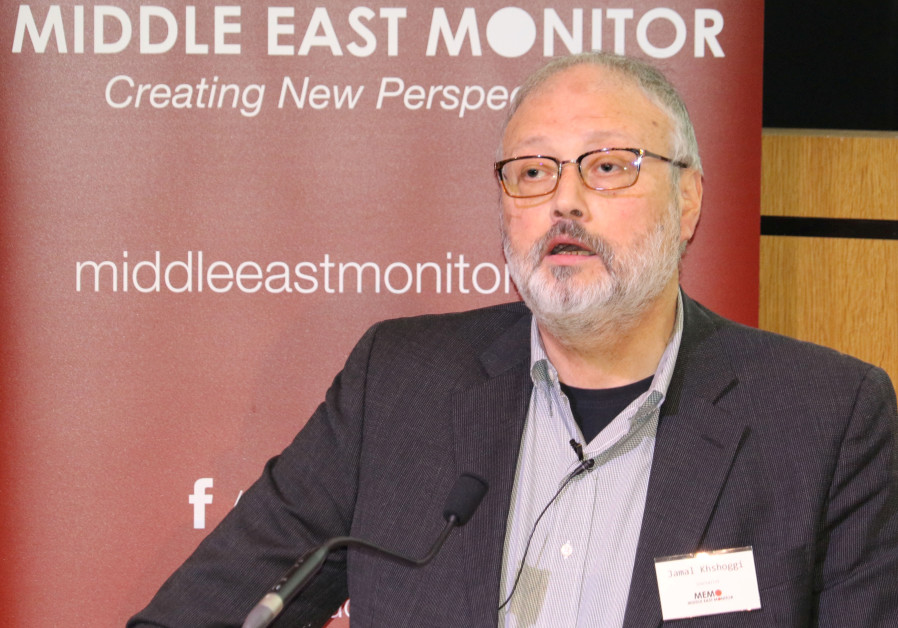“It is certainly not in our interests to see the status of the Saudi government diminished in Washington.”

Here’s the rule: If some major event happens in the Middle East, it will generally have an impact on Israel.
The disappearance of Saudi government critic and Washington Post columnist Jamal Khashoggi in Turkey – and the very real possibility that the Saudis either kidnapped him, killed him, or both – is no exception.
On the surface, this story seems distant from Jerusalem. Israel was not involved in any way, and even Turkish President Recep Tayyip Erdogan, who never misses an opportunity to blast Israel, is not saying that Jerusalem had anything to do with it.
Then how does this impact Israel? As Eran Lerman, the vice president of the Jerusalem Institute for Strategic Studies and a former deputy national security council head, said: “It is certainly not in our interests to see the status of the Saudi government diminished in Washington.”
But, as it increasingly appears that the Saudi government – even the reformist Crown Prince Mohammed bin Salman, known as MBS – had a hand in Khashoggi’s disappearance, that is exactly what is starting to happen: the shine is coming off MBS’s luster.
It didn’t start with this incident. Already in August, when Saudi Arabia expelled Canada’s ambassador and froze new trade deals because of Canadian criticism of Saudi human rights violations, voices were raised in the US asking whether MBS is the right leader to cozy up to.
The Khashoggi incident is strengthening that trend. As a New York Times headline read on Thursday, “Khashoggi’s disappearance puts Kushner’s bet on Saudi crown prince at risk.”US President Donald Trump’s son-in-law and senior adviser Jared Kushner has invested much in building a relationship with MBS, and Jerusalem – for its own interests – hopes that this particular bet does not turn sour.
And Saudi Arabia’s position in Washington is indeed imperiled, according to Senate Foreign Relations Committee Bob Corker, a Republican, who said on Wednesday that the opinion of the kingdom on Capitol Hill had reached a nadir. The committee that day triggered the Magnitsky Act with respect to Khashoggi’s disappearance, forcing the Trump administration to report to Congress within 120 days a determination of what happened – and a decision on whether to sanction those responsible.
As Dore Gold, the head of the Jerusalem Center for Public Affairs and former Foreign Ministry director-general, said: “This problem could be used by the Iranians to drive a wedge between the West and Saudi Arabia.”
That is bad for Israel, he added, because “anything that strengthens Iran’s posturing in the Middle East is bad for Israel,” and in the Mideast balance of power, a weakened Saudi Arabia means a strengthened Iran.
It also means a strengthened Turkey, which could explain why Ankara is going the full monty on this issue, releasing surveillance tape and leaking information about the investigation.
“Turkey is part of an axis with Qatar,” Gold said, “and that puts Saudi Arabia at odds with the Turkish government.
“There is another theme in the relations as well, and that is that Saudi Arabia looks around the Middle East and sees hegemonic powers that threaten its vital security interests,” he said. “The most obvious is Iran, but Turkey is another hegemonic power that could put Saudi interests at risk. For this reason, Saudi Arabia was never an opponent of Kurdish independence aspirations.”
At first glance one might think that the reason Saudi Arabia losing status in Washington is bad for Israel is because of the increased cooperation between Israel and Saudi Arabia, and the hope that Prime Minister Benjamin Netanyahu often alludes to of being able to leverage that into Sunni pressure on the Palestinians to show some flexibility in the diplomatic process. A Washington-Riyadh tiff could compel the Saudis to rethink this cooperation.
But that observation, Lerman maintained, misses a critical point: Israel’s major concern – the number one issue on its agenda – is Iran, and not the Palestinians. And a Saudi Arabia that does not have the same cachet in Washington is bad for Israel because “the Saudis, even more so than us in some ways, have turned around the American position on Iran. This is central and uppermost in our list of priorities, and so to have a Saudi government held in high regard in Washington is very much in our interest,” Lerman said.
True, Netanyahu led the rhetorical charge in Washington to get Trump to withdraw from the Iranian nuclear deal earlier this year, but the Saudis – and other Persian Gulf states – were equally involved behind closed doors lobbying heavily against it.
But Saudi influence in Washington will now be dimmed if its involvement in the Khashoggi incident is proved beyond doubt.
Lerman envisions a scenario where Jewish political organizations in Washington – such as the American Jewish Committee, which he once worked for as head of its Israel office – may actually go to Capitol Hill, as they have done in the past, and discreetly lobby for the Saudis, something that could paradoxically bring the two countries even closer together. While Saudi Arabia has excellent relations with the Trump administration, its position in Congress – where there is mounting criticism – is much weaker, and they might look to Israel to help press their case.
The one positive fallout from the Khashoggi affair, Lerman said, might be that it will force MBS to be more cautious.
“For all the good that he has been doing from our perspective on the balance of power in the region, there is one after-effect that I hear all too often from people watching – that he is impetuous, reckless, doing too much, too fast and that he is not careful enough about the consequences. So if this ends up adding a dimension of caution,” Lerman said, “it will not be a bad thing.”
As reported by The Jerusalem Post
